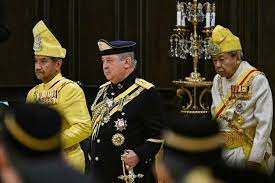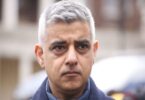KUALA LUMPUR (Agencies): Malaysia installed on Wednesday a billionaire motorcycle-riding sultan as the country’s newest king, a ceremonial role that is expected to gain more significance in governance during his term.
The Muslim-majority Southeast Asian nation is a constitutional monarchy with a unique system in which the king’s post rotates between the chiefs of its nine Islamic royal Malay houses every five years.
Dressed in dark blue ceremonial attire, Sultan Ibrahim Sultan Iskandar, the ruler of the country’s southern Johor state, took his oath of office as he ascended the throne as Malaysia’s 17th supreme monarch.
“With this oath, I solemnly and truly profess to be faithful, to rule fairly for Malaysia in accordance with the laws and constitution of the country,” the 65-year-old royal said at the national palace in Kuala Lumpur.
The ceremony was witnessed by the other Malay sultans, government officials and various dignitaries.
Sultan Ibrahim was elected by his fellow monarchs last year. Appointments to the role follow a rotation held since Malaysia’s independence from British colonial rule in 1957.
He replaces Al-Sultan Abdullah Sultan Ahmad Shah of the central state of Pahang — whose reign ended Tuesday — as the nation’s new Yang di-Pertuan Agong or “He Who is Made Lord.”
Thousands of people lined the streets in the state capital of Johor Bahru early Wednesday morning to see off their sultan as he traveled from his palace in a royal entourage toward the city’s airport.
On arrival in Kuala Lumpur, he was greeted by members of Malaysia’s ruling elite and officials as he inspected a guard of honor before taking his oath.
Prime Minister Anwar Ibrahim welcomed Sultan Ibrahim and his Queen Raja Zarith Sofiah in their new stations.
“The people and I will continue pledging unwavering obedience and loyalty to His Majesty,” he said in a Facebook post.
“We pray His Majesty and the entire Royal Institution will be showered with blessings and always be in good health, wellness and sovereignty.”
A powerful and influential figure, Sultan Ibrahim presides over the country’s southernmost peninsular state, which borders Singapore by a causeway.
Holding significant business interests, he and his family have been estimated to be worth at least $5.7 billion, with shares in major Malaysian firms as well as land in Singapore.
A motorcycle enthusiast, he leads an annual motor vehicle tour of the state and also commands his own private army, the only state allowed to do so.
Malaysia’s kings serve as the official head of Islam in the country and commander-in-chief of its armed forces.
While they hold only ceremonial power, they can appoint a lawmaker who has a parliamentary majority as the country’s premier and exercise certain discretionary powers during a national crisis.
A fiercely outspoken royal, Sultan Ibrahim vowed in a December interview with Singapore’s Straits Times newspaper not to be a “puppet king.”
He said at the time: “There are 222 of you (lawmakers) in Parliament. There are over 30 million (Malaysians) outside. I’m not with you, I’m with them.
“I will support the government, but if I think they are doing something improper, I will tell them.”
BowerGroupAsia director Arinah Najwa Ahmad Said told Arab News she expected to see a politically stable administration in the near future, with Sultan Ibrahim exercising a more “hands-on leadership.”
She said: “He would be more hands-on in governance. How hands-on it will be remains to be seen, but there would be a lot more oversight on things.
“He will be a bit more vocal on certain issues and he will try to command a certain kind of order at least.”
She added that Sultan Ibrahim was also expected to focus on more socio-economic development especially in the state of Johor, given its border with wealthy neighbor Singapore.
Malaysia’s royalty has a lineage that dates back to the 15th century, and it commands great respect from the country’s population of 33 million, especially from the Muslim ethnic Malay majority.







